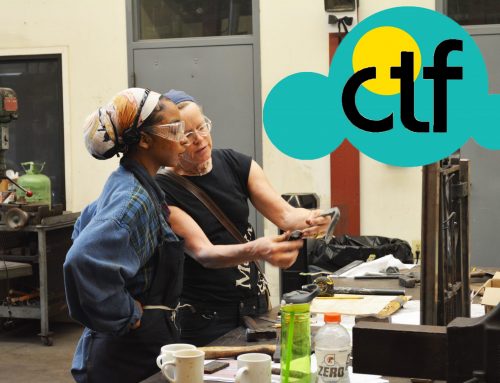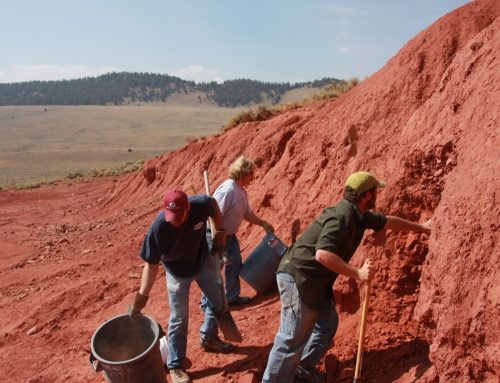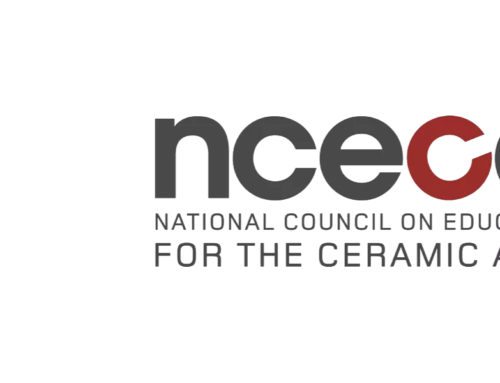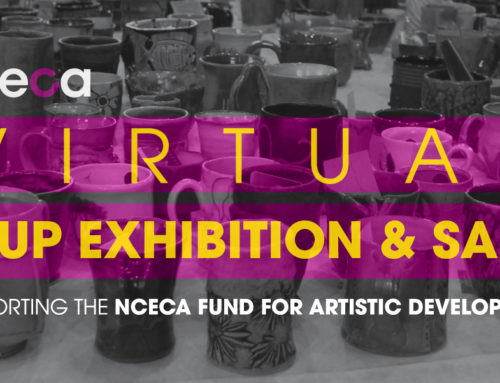For our 50th Anniversary Conference, we are mixing things up with the demonstrating artists: pairing an established artist with someone they have worked with or taught over the years. With our theme as “Makers, Mentors and Milestones” I want to begin my blog series on our demonstrators with David MacDonald, professor emeritus at Syracuse University and recipient of NCECA’s Excellence in Teaching Award in 2011, for personal reasons that will become apparent.
 David MacDonald grew up in Hackensack, NJ. Which I only mention because it is fun to say “Hackensack.” MacDonald began his artistic career as a painter before moving onto ceramics and has joked he would have made more money if he made one pot and painted it over and over again. I have pointed out to him what a loss it would have been for the field of ceramics and how difficult it is to drink coffee from a painting. His early works expressed the pain and anger of being an African American man in a society where that population is not respected or treated fairly. At an art opening, filled with his politically charged works, an older woman approached, asking (paraphrased) “Is there anything positive about being an African American Man?” This simple, but loaded question has become the foundation of his work: exploring, highlighting and celebrating the art and culture of Africa and its descendents. He finds beauty in tribal scarification, tight rows of braids or the elaborate beaded bands that stretch a neck to unbelievable lengths. Not without its barbs, his art investigates The Middle Passage and the history of slavery as well.
David MacDonald grew up in Hackensack, NJ. Which I only mention because it is fun to say “Hackensack.” MacDonald began his artistic career as a painter before moving onto ceramics and has joked he would have made more money if he made one pot and painted it over and over again. I have pointed out to him what a loss it would have been for the field of ceramics and how difficult it is to drink coffee from a painting. His early works expressed the pain and anger of being an African American man in a society where that population is not respected or treated fairly. At an art opening, filled with his politically charged works, an older woman approached, asking (paraphrased) “Is there anything positive about being an African American Man?” This simple, but loaded question has become the foundation of his work: exploring, highlighting and celebrating the art and culture of Africa and its descendents. He finds beauty in tribal scarification, tight rows of braids or the elaborate beaded bands that stretch a neck to unbelievable lengths. Not without its barbs, his art investigates The Middle Passage and the history of slavery as well.
MacDonald is renown as a vessel maker and craftsman: revered and collected are his generous jars and bowls, teapots that pour perfectly, large vases and magnificent platters that exceed 3 feet in diameter. On stage, in addition to his vast library of wheel skills, he will demonstrate his technique for throwing his platters as well as his intricate carving method using a humble wooden tool.
I came to know David when I saw the message from my dad “Professor MacDonald called. Please call him back regarding your graduate application.” Panic set in, I get nervous calling strangers on the phone. Within five minutes, my anxiety abated and I felt like I had known him for a while. His warm, deep voice and sly humor put me at ease. I remember thinking, this is someone who I can spend three years learning from and be comfortable with to talk about my art or process, or even jazz. An hour and a half flew by as he told me more details about the program, facilities and amenities that Syracuse has to offer (Great upper body strength from shoveling snow translates well for wedging I have found) and I felt more confident. As we came to a close, he asked if I had any other questions. I asked “What other responsibilities are required of a graduate assistant?” He answered “Wash my truck.” I was hooked and knew I had found my program and mentor. Considering that I was and am a sculptor and not a potter by any stretch wasn’t an issue. I wanted to learn from this man.
Countless other students can share similar stories of how he inspired, guided and intimidated them into being their best. Undergrads would scurry to look even busier when they heard his voice, sonorous, coming down the hallway. His Socratic method of questioning was usually delivered with him peering at you over his bifocals with a mischievous gleam in his eye. I still rely on him for advice and assurance and a little ass kicking, all these years after I got my degree. I owe him so much and I still owe him a car wash.
Sharing the demonstration time with David MacDonald will be his colleague from Syracuse, Sharif Bey.
 Dr. Sharif Bey is an Associate Professor of Art Education at Syracuse University. Bey earned his PhD in Art Education from the Pennsylvania State University. He holds an M.F.A in Studio Art from The University of North Carolina at Greensboro and a B.F.A, in ceramics, from Slippery Rock University of Pennsylvania.
Dr. Sharif Bey is an Associate Professor of Art Education at Syracuse University. Bey earned his PhD in Art Education from the Pennsylvania State University. He holds an M.F.A in Studio Art from The University of North Carolina at Greensboro and a B.F.A, in ceramics, from Slippery Rock University of Pennsylvania.
Sharif Bey grew up in Pittsburg and started taking classes in the Apprenticeship Program at the Manchester Craftsmen’s Guild’s (MCG) where he crossed paths with NCECA’s Executive Director Josh Green. Like MacDonald, Bey’s work explores facets of ritual, identity and functionality within contemporary and historical African American viewpoints. His mixed media sculptures seek to honor the history of an object: borrowing elements of African necklaces, tobacco pipes or head-dresses, while placing it in a new context. He describes his creative process as “exploring my identity as an African-American, husband, father, artist, educator, art student, and functional potter creates a dialogue in the studio that never grows tiresome.” Studio artist, educator and writer, he will bring a lot to the stage.














[…] NCECA Blog: Monday with Mary – Demonstrating Artists, Part 1 […]